- Home
- Best Pet for Me
- Green Iguana Care: Tips to Keep Your Green Iguana Happy and Healthy
Green Iguana Care: Tips to Keep Your Green Iguana Happy and Healthy
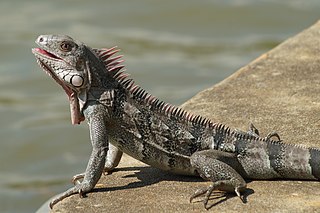 https://commons.wikimedia.org/wiki/File:Iguana_V.jpg
https://commons.wikimedia.org/wiki/File:Iguana_V.jpgGreen iguanas are the largest of the pet iguanas and are among the most popular reptile pets, but they come with unique challenges that potential owners should carefully consider.
If you're thinking about adopting one, it’s essential to understand that green iguanas are not your typical pet—they are demanding and require a well-thought-out living environment and regular care.
They can be aggressive if they are not handled properly and they are very powerful. You might consider using protective gear when handling them.
They grow to be big, so they need a large cage. They are the type of reptile that likes to climb, so height in their enclosure is important.
While they can be fascinating, they can also be difficult to care for, especially for first-time reptile owners.
Green Iguana Care: Understanding Their Aggression and Handling Needs
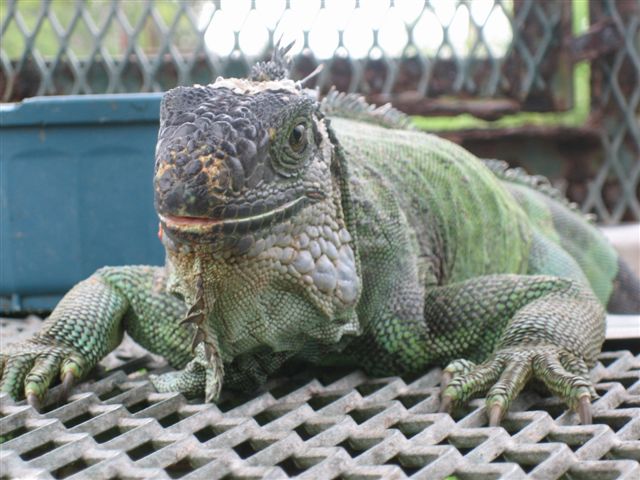 https://commons.wikimedia.org/wiki/File:Iguana_iguana_Florida_2006.JPG
https://commons.wikimedia.org/wiki/File:Iguana_iguana_Florida_2006.JPGGreen iguanas can be unpredictable and potentially dangerous if they feel threatened. Both their bite and their powerful swinging tail can cause injury.
Their bites are sharp and strong, capable of drawing blood, while their tail can deliver a hard, whip-like strike that can result in bruising or even broken skin. This means that handling should always be done carefully, and it's crucial to respect their space.
If they feel cornered or threatened, they may react aggressively in an attempt to defend themselves. For this reason, it's important to avoid sudden movements and loud noises around them.
Training them to become accustomed to gentle handling from an early age can help reduce the risk of aggression, but even well-adjusted iguanas can be defensive if they feel unsafe.
In addition to being careful when handling them, you should always supervise them when they are around other pets. While iguanas may not actively seek out confrontations, their size, strength, and defensive behavior can pose a risk to smaller animals, including other reptiles, cats, or dogs.
It's important to ensure that your iguana's enclosure is secure and that they aren't placed in a position where they could feel threatened by other pets, especially if the other animals are not familiar with reptiles.
Green iguanas can be wonderful pets for the right owners, but their potential for aggression, especially when they are startled or feel threatened, requires careful thought and consideration in their care and managemen
Green Iguana Care: Understanding Their Behavior and Handling Needs
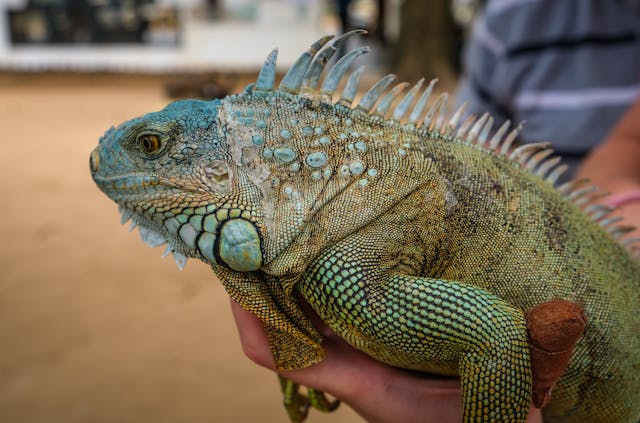 Photo by Magda Ehlers: https://www.pexels.com/photo/green-and-blue-iguana-on-person-s-hand-10598083/
Photo by Magda Ehlers: https://www.pexels.com/photo/green-and-blue-iguana-on-person-s-hand-10598083/Green iguanas are fascinating creatures, but they are not naturally inclined to form close bonds with humans.
As wild animals, they are generally wary of people and can be defensive when they feel threatened.
However, with proper green iguana care and consistent handling, they can learn to tolerate—and sometimes even enjoy—human interaction.
It’s important to start handling them gently from a young age to help them become accustomed to human presence. Over time, with patience and positive reinforcement, some iguanas may become comfortable enough to allow you to pet or hold them.
While handling them, be cautious of their claws, teeth, and especially their powerful tails. Iguanas can be surprisingly strong, and their tails can deliver painful swipes if they feel threatened or overstimulated.
If your iguana does show signs of aggression, such as tail whipping or hissing, it’s important to give them space to avoid stressing them out.
Some iguanas may even enjoy climbing on their owners, but it’s essential to ensure they feel secure and comfortable in these interactions.
As part of responsible green iguana care, always remember to provide a safe and enriching environment for your pet. This will allow them to thrive and possibly develop a more relaxed attitude toward handling.
Green Iguana Care: Embracing Their Laid-Back Nature and Basking Habits
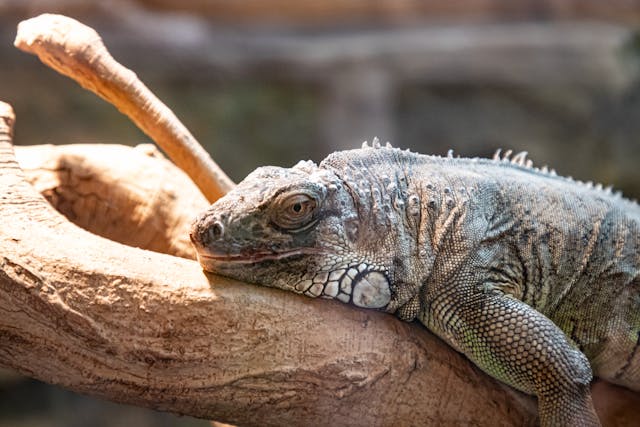 Photo by Boris Hamer: https://www.pexels.com/photo/wood-animal-tree-zoo-28281755/
Photo by Boris Hamer: https://www.pexels.com/photo/wood-animal-tree-zoo-28281755/Green iguanas are known for their laid-back nature, often spending much of their time basking in the warmth of their environment.
While they are active during the day, they are not the most energetic of creatures.
Instead, they enjoy lounging on branches or in high places within their enclosure, soaking up heat from basking lamps.
This behavior is completely natural, as iguanas are cold-blooded and need external heat sources to regulate their body temperature.
Iguana Size: They Grow Fast and Large
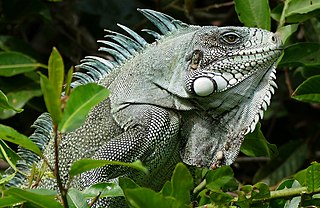 https://commons.wikimedia.org/wiki/File:Green_Iguana_(Iguana_iguana)_-_Flickr_-_berniedup.jpg
https://commons.wikimedia.org/wiki/File:Green_Iguana_(Iguana_iguana)_-_Flickr_-_berniedup.jpgGreen iguanas can grow to be quite large, and they grow rapidly, especially during their early years.
They can reach lengths of up to 7 feet, including their tail, and weigh as much as 20 pounds.
This rapid growth means that as a pet owner, you'll need to plan for their long-term space and care needs, ensuring they have enough room to thrive as they continue to grow
Green Iguana Care: Temperature and Humidity Requirements
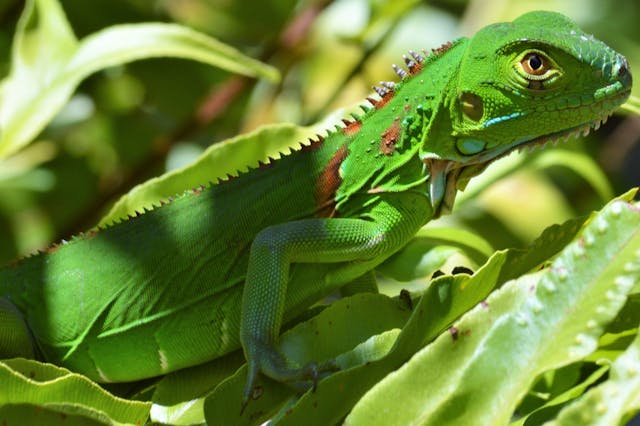 Photo by César+Mirna Choto: https://www.pexels.com/photo/green-iguana-on-leaves-6442270/
Photo by César+Mirna Choto: https://www.pexels.com/photo/green-iguana-on-leaves-6442270/Proper temperature and humidity are crucial for green iguana care.
They require a basking area with temperatures around 95°F to regulate their body heat effectively. Additionally, they need a hot zone that stays at 85°F or higher and a cooler area that should not drop below 75°F.
Maintaining these temperature gradients allows them to regulate their body temperature naturally.
Green iguanas also thrive in high humidity, so keeping their cage at around 70% humidity is essential.
You can mist them a few times a day to maintain moisture levels.
They will also enjoy occasional warm baths, which help keep their skin hydrated and promote overall well-being.
Regular attention to these environmental factors ensures that your iguana stays healthy and comfortable.
Green Iguana Care: Best Habitat for Your Pet Iguana
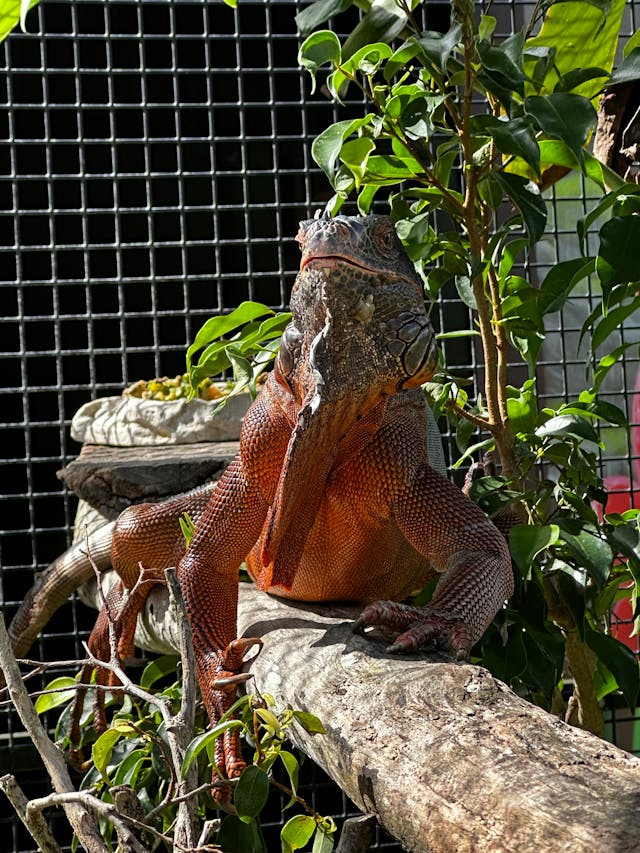 Photo by Jennifer Your Digital Solmate: https://www.pexels.com/photo/iguana-in-zoo-20830411/
Photo by Jennifer Your Digital Solmate: https://www.pexels.com/photo/iguana-in-zoo-20830411/When it comes to housing, green iguanas need a large, tall habitat that allows for plenty of climbing.
These reptiles are natural climbers and will spend much of their time scaling branches, so the taller the enclosure, the better.
Ideally, their cage should measure at least 12 feet long, 6 feet wide, and 8 feet tall, providing ample space for movement and exercise.
Due to their size and need for vertical space, they are not suited for small apartments or cramped environments.
Some owners even go as far as converting an entire small room, large closet, or sunroom into an iguana habitat.
In terms of bedding, green iguanas don’t require anything too elaborate since they spend most of their time climbing rather than burrowing. Reptile carpet, paper bedding, or aspen and cypress bedding are all good options, as long as the bedding doesn't contain particles small enough that the iguana could ingest.
One of the most important aspects of green iguana care is providing proper UV lighting. These reptiles need 10 to 12 hours of UV exposure each day to help synthesize vitamin D3, which is vital for their bone health.
Ideally, natural sunlight is the best source of UV light, but a high-quality UVB bulb can also be used if you’re keeping them indoors.
Regular exposure to UV light ensures they thrive in a healthy environment.
Green Iguana Care: Diet and Hydration Needs
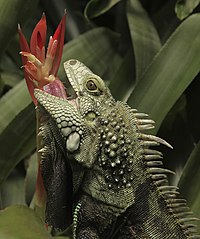 https://commons.wikimedia.org/w/index.php?search=Green+Iguana&title=Special:MediaSearch&go=Go&type=image
https://commons.wikimedia.org/w/index.php?search=Green+Iguana&title=Special:MediaSearch&go=Go&type=imageGreen iguanas are strict vegetarians, meaning their diet should be composed of plant-based foods only.
Unlike many other reptiles, they don’t need crickets, roaches, or other insects. In fact, too much protein can harm their digestive system and lead to health issues like kidney damage.
The best diet for an iguana includes a variety of leafy vegetables, such as collard greens, dandelion greens, and mustard greens, which should be chopped into small pieces to make it easier for them to eat.
Commercial iguana food can be a good supplement, but it’s essential to ensure it’s specifically designed for herbivorous reptiles.
Providing a balanced diet that’s rich in fiber and low in protein is key to keeping your iguana healthy.
A calcium supplement is also recommended, as it supports their bone health, especially since green iguanas require vitamin D3 to properly absorb calcium.
Hydration is crucial for green iguanas as well. They are known to drink a lot of water, so always make sure fresh, clean water is available in their enclosure.
Some iguanas may even enjoy drinking from a dripping water source or a shallow dish. It's essential to keep their hydration levels up to maintain healthy digestion and overall well-being.
Green Iguana Lifespan and Health Considerations
 Charles J. Sharp, CC BY-SA 4.0
Charles J. Sharp, CC BY-SA 4.0 Green iguanas can live for 20 years or more, making them a long-term commitment for any pet owner.
Before adopting one, it's essential to understand the responsibility involved, especially if you plan to keep them for their entire lifespan.
If you're adopting an older iguana, keep in mind that they may not live as long, but they still require the same level of care and attention.
One of the most important aspects of green iguana care is their health. These reptiles are prone to kidney disease, particularly if they are not properly hydrated. Ensuring that your iguana always has access to fresh, clean water is critical for maintaining its health.
Additionally, providing calcium supplements can help prevent metabolic bone disease, a common issue in iguanas. This condition can lead to brittle bones and deformities, so a proper diet with the right nutrients is key.
It's also important to note that green iguanas, like many reptiles, can carry salmonella. This bacteria can be transmitted to humans, so it's essential to wash your hands thoroughly after handling your iguana or cleaning its habitat.
Taking these precautions will help protect both you and your pet, ensuring a healthy and enjoyable relationship.
To find out about other reptile pets and pets of other species, return to the Best Pet For Me List.






New! Comments
Have your say about what you just read! Leave me a comment in the box below.